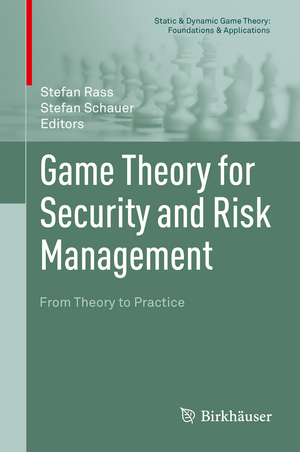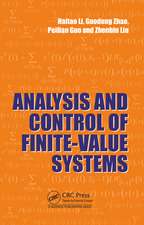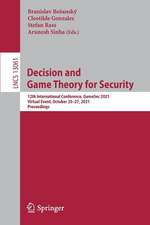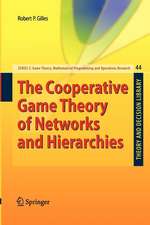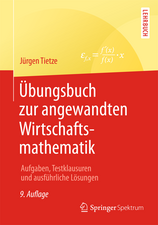Game Theory for Security and Risk Management: From Theory to Practice: Static & Dynamic Game Theory: Foundations & Applications
Editat de Stefan Rass, Stefan Schaueren Limba Engleză Hardback – 19 iul 2018
The first part of the book presents the theoretical basics, covering various different game-theoretic models related to and suitable for security engineering. The second part then shows how these models are adopted, implemented, and analyzed. Surveillance systems, interconnected networks, and power grids are among the different application areas discussed. Finally, in the third part, case studies from business and industry of successful applications of game-theoretic models are presented, and the range of applications discussed is expanded to include such areas as cloud computing, Internet of Things, and water utility networks.
| Toate formatele și edițiile | Preț | Express |
|---|---|---|
| Paperback (1) | 491.63 lei 38-44 zile | |
| Springer International Publishing – 14 dec 2018 | 491.63 lei 38-44 zile | |
| Hardback (1) | 794.70 lei 6-8 săpt. | |
| Springer International Publishing – 19 iul 2018 | 794.70 lei 6-8 săpt. |
Preț: 794.70 lei
Preț vechi: 969.15 lei
-18% Nou
Puncte Express: 1192
Preț estimativ în valută:
152.06€ • 159.19$ • 125.82£
152.06€ • 159.19$ • 125.82£
Carte tipărită la comandă
Livrare economică 05-19 aprilie
Preluare comenzi: 021 569.72.76
Specificații
ISBN-13: 9783319752679
ISBN-10: 3319752677
Pagini: 392
Ilustrații: XXXII, 418 p. 108 illus., 42 illus. in color.
Dimensiuni: 155 x 235 x 34 mm
Greutate: 0.81 kg
Ediția:1st ed. 2018
Editura: Springer International Publishing
Colecția Birkhäuser
Seria Static & Dynamic Game Theory: Foundations & Applications
Locul publicării:Cham, Switzerland
ISBN-10: 3319752677
Pagini: 392
Ilustrații: XXXII, 418 p. 108 illus., 42 illus. in color.
Dimensiuni: 155 x 235 x 34 mm
Greutate: 0.81 kg
Ediția:1st ed. 2018
Editura: Springer International Publishing
Colecția Birkhäuser
Seria Static & Dynamic Game Theory: Foundations & Applications
Locul publicării:Cham, Switzerland
Cuprins
Part I: Theory.- Utilizing Game Theory for Security Risk Assessment.- Decision Making when Consequences are Random.- Security Strategies and Multi-Criteria Decision Making.- A Scalable Decomposition Method for the Dynamic Defense of Cyber Networks.- Factored Markov Game Theory for Secure Interdependent Infrastructure Networks.- Part II: Practice.- G-DPS: A Game-Theoretical Decision-Making Framework for Physical Surveillance Games.- A Game-Theoretic Framework for Securing Interdependent Assets in Networks.- Random Damage in interconnected Networks.- Optimal Dispatch of Electric Transmission Systems Considering Interdependencies with Natural Gas Systems.- Managing Security Risks Interdependencies between ICT and Electric Infrastructures: A Game-Theoretical Analysis.- Part III: Case Studies.- Security and Interdependency in a Public Cloud: A Game-Theoretic Approach.- A Risk Management Approach for Highly Interconnected Networks.- Protecting Water Utility Networks from Advanced PersistentThreats: A Case Study.- Assessing the Impact of Malware Attacks in Utility Networks.- Game-Theoretic Optimization for Physical Surveillance of Critical Infrastructures: A Case Study.- Smart SECPLAN: A Process Implementation Tool for Hybrid Risk Management.
Recenzii
“The volume may be interested both for mathematicians and engineers looking for applications of their knowledge in economy and managers who have to solve practical risk and security problems arising in real life.” (Andrzej Świerniak, zbMATH 1422.91033, 2019)
Textul de pe ultima copertă
The chapters in this volume explore how various methods from game theory can be utilized to optimize security and risk-management strategies. Emphasizing the importance of connecting theory and practice, they detail the steps involved in selecting, adapting, and analyzing game-theoretic models in security engineering and provide case studies of successful implementations in different application domains. Practitioners who are not experts in game theory and are uncertain about incorporating it into their work will benefit from this resource, as well as researchers in applied mathematics and computer science interested in current developments and future directions.
The first part of the book presents the theoretical basics, covering various different game-theoretic models related to and suitable for security engineering. The second part then shows how these models are adopted, implemented, and analyzed. Surveillance systems, interconnected networks, and power grids are among the different application areas discussed. Finally, in the third part, case studies from business and industry of successful applications of game-theoretic models are presented, and the range of applications discussed is expanded to include such areas as cloud computing, Internet of Things, and water utility networks.
The first part of the book presents the theoretical basics, covering various different game-theoretic models related to and suitable for security engineering. The second part then shows how these models are adopted, implemented, and analyzed. Surveillance systems, interconnected networks, and power grids are among the different application areas discussed. Finally, in the third part, case studies from business and industry of successful applications of game-theoretic models are presented, and the range of applications discussed is expanded to include such areas as cloud computing, Internet of Things, and water utility networks.
Caracteristici
Provides a link from theory to practice in security engineering and risk management for practitioners Demonstrates how game-theoretical methods can be implemented for those who are not experts in game theory Covers a diverse range of application domains
